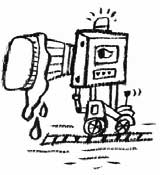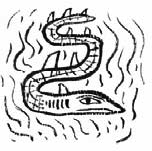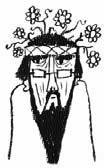The Yggyssey (14 page)
Authors: Daniel Pinkwater

"The coracle," Big Audrey said. "It's light. I can carry it myself. You guys take these paddles." Seamus and I took hold of four canoe paddles, and Big Audrey lifted the coracle over her head like a huge umbrella. "Next stop is the Hole," she said.

Juvenile Hole was perfectly round, with straight sides, like a well. It was maybe thirty or forty feet deep. There were benches in the bottom, with maybe a dozen kids sitting, looking at a big TV screen. There were no cops or guards, just what looked like a TV camera that ran around the inside of the bottom of the hole on tracks, the lens pointed in at the kids on the benches. Some of the kids had ratty-looking blankets over their shoulders. We tried to pick out which one was Neddie.
As we peered into the Hole, we became aware of Uncle Father Palabra, the Farblonget brothers, and Gwendolyn Marshrat beside us.
"Which one is your friend?" Uncle Father Palabra whispered.
"He's there, sitting at the end," Seamus whispered back.
"Let's do this," Uncle Father Palabra said. Uncle Father Palabra and one of the Farblonget brothers stood at the edge of the hole and lowered Gwendolyn Marshrat and the other Farblonget brother. Gwendolyn had the shoofly pie with her. She slapped the shoofly pie over the lens of the TV camera on tracks. It stuck. Then the two of them scooped Neddie up, under the arms, and Uncle Father Palabra and the other Farblonget brother reeled them up. It didn't take more than fifteen seconds.
"Say, there's a place here in town where you can get a hamburger that weighs three-quarters of a pound," Neddie said. "It has special sauce, and it is made with Japanese kobe-style beef, whatever that is, and it's a limited-time offer. Can we stop and get one?"
"Brainwashing works," Big Audrey said.
"Get going," Uncle Father Palabra said. We four kids made for the Mahakahakakatuk, with Audrey and Seamus holding the coracle over us, and all of us underneath it, our scampering feet sticking out below. We must have looked like a big black turtle scooting along the sidewalk.
"This reminds me of something," Neddie said.
From behind us we heard a voice blaring over a loudspeaker: "Who put a shoofly pie over the lens of the television camera?"
And we heard Uncle Father Palabra shout, "It was I, Norman! Norman put the shoofly pie on your fershlugginer lens!"
"Hee hee!" Big Audrey giggled. "Now they're going to think Norman did it."
The next thing I knew, we were in the coracle on the river, the big Mahakahakakatuk, paddling and spinning.

"This is Big Audrey," I told Neddie. "She and a bunch of other people rescued you from Juvenile Hole."
"Pleased to meet you, and thanks very much," Neddie said. "They have the biggest television screen I've ever seen down there. We have better programs in Los Angeles, but they have better ads in New Yapyap City. What kind of boat is this?"
"It's a coracle," Big Audrey said.
"It's round."
"It's all we've got. My uncle, Uncle Father Palabra, built it. Ancient type of boat."
"It doesn't steer all that well," Neddie said. That was the truth. The coracle had a tendency to spin and it careened all over the river. After a while, we started to get the hang of it. With two people paddling and two others using their paddles as rudders at the front and the back of the boatâassuming it had a front and a backâwe could get it to go more or less in one direction.
"What river is this?" Neddie wanted to know.
"It's the Mahakahakakatuk," Big Audrey said. "The object is to get to the other side."
"How long would it take if we were in something normal?" I asked.
"I don't know. Maybe half an hour."
"And as we are?"
"It looks like it will take all nightâhours, anyway."
"What are those hissing and clicking noises?"
"There are things in the river."
"Bad things?"
"Well, I wouldn't dangle my fingers in the water," Big Audrey said.
"Have you been on the river before?" I asked.
"No. People don't go on the river much. It's the things. This is the first time the coracle has been in the water, too. Considering Uncle Father built it from pictures in an encyclopedia, it's working fairly well, I'd say."
"It feels like something is gnawing on my oar," I said.
"I wouldn't be surprised," Big Audrey said. "What exactly are the things in this river?" Seamus Finn asked.
"Mostly eel-sharks," Big Audrey said.
"And they're bad?"
"How good can something that's an eel and a shark be?" There was an evil-smelling mist rising from the river, and the moon lit up patches of greasy-looking slime. We were quiet and serious as we paddled and steered for the far shore and listened to the hissing and clicking.
"At least there aren't any whales in this river," Seamus Finn said after a long time.
"Oh, there are," Big Audrey said. "They eat the eel-sharks."
We kept steering and paddling.

Dawn broke on the river. We were getting close to the shore. We were tired and hungry, and our hands were sore.
"Travel by
coracle
is the worst," Neddie said. "Who invented them, anyway?"
"Well, the word
coracle
comes from the Welsh
cwrwgl,
" Big Audrey said. "But they go back thousands of years, and similar boats turn up in all kinds of cultures. The
curragh
is an Irish boat, the Mandan Indians made bull boats, and the Iraqi
gufa,
the southern Indian
parisal,
and the Tibetan
ku-dru
are all along the same lines. As you can see, it's basically a big basket with hide stretched over it and tar spread over that to make it waterproof. And you have to admit, it got us where we wanted to go."
"Do you have Wales, and Mandan Indians, and Tibet in this world, same as ours?" Neddie asked.
"Apparently," Big Audrey said.
"I want to go someplace where they're serving breakfast," I said.
"Look!" Seamus Finn said. "People!"
"Or Munchkins," I said.
There were people! Short people! They were up to their middles, which would be up to our knees, in the river, scooping up fish in nets. They were all at least eighty years old and had long white hairâthe men had long beards. They were wearing clothes in all the colors of the rainbow, and some of them had headbandsâalso rainbow-coloredâflowers in their hair, and bead necklaces and bracelets. We paddled closer.
"Dude!" one of the old people said. "It's kids in a coracle!"
"Far out!" another old person said.
"Heavy!" said another one.
"Aren't you afraid of the eel-sharks, standing in the water like that?" Seamus asked the old people.
"No hassle, man," one of the old bearded guys said. "They know we're cool. We do our thing and they do theirs. I bet you kiddies would like some breakfast. Help us carry the baskets of fish and we'll lay some nutrition on you."
We beached the coracle and helped the weird old people carry baskets of fish up the bank.
"What do you do with the fish?" I asked them.
"We smoke them."
"Oh, and then you sell them?"
"Huh?"
The old folks lived in a collection of tents, shacks, and broken-down school buses. Everything was painted in every color, just like their clothing. Introductions were made. They had names like Sunflower, Safflower, Cornflower, Wholewheatflower, Sun, Moon, Star, Sunshine, Moonshine, Weirdbeard, Popdaddy, and Woovy Groovy.
Breakfast was something Gypsy Boots would have been proud ofâfruit, juice, cereal consisting of oats, almonds, prunes, and raisins, and French toast made with health bread with nuts and seeds and twigs and things in it. The old people were friendly. They told us they were hoopies, which meant they had dropped out of society, lived peacefully, and didn't harm any living thing, except fish. They said they tried to live in such a way that they would not be hassled by Uncle. They called him The Man. They also felt strongly that, if possible, one should try never to piss off a witch. Mama Banana seemed to be the head hoopie. She asked us lots of questions about where we had come from and where we were going.
"So you're going to make the scene at the annual supernatural freak-out on the Devil's Shoestring? It's a hassle getting there, but you should do your own thing. I mean, we create our own reality. You children are welcome to crash here for as long as you like." Then all the hoopies got out guitars, and whistles, and drums and bells, and spent the rest of the morning making music.
We stayed with the hoopies for a while. They were easy to be around, and we liked the healthy food and the music. We helped them fish, when they felt like fishing, and spent time wandering in the woods above the river, collecting flowers and mushrooms, all of which we ate or wore. And Sunbeam, Moonbeam, and Rainbeam showed us how to dye our clothes all colors, like theirs.
When we decided it was time to do our own thing and split, the sweet old hoopies gave us love beads and told us to create our own reality, and be mindful of karma. Karma is what happens to you because of what you didâevery action has a reaction, and if you live groovily, you will have groovy experiences.
We knew the general direction we needed to go. The hoopies had never been as far as the Devil's Shoestring, because going so far was just such a drag, man. We started up the path, carrying bags of granola, with flowers in our hair. The hoopies cried and waved goodbye.
"Stay on the road! Don't play cards with strangers! If you meet a witch, don't piss her off! Don't piss off a witch! Don't trust anyone over ninety!" they called after us.

In addition to the granola and flowers, Mama Banana had given me another gift. She told me about my name. "Do you know what your name means, little one?" Mama Banana, the matriarch of the hoopies, asked me. Calling me "little one" struck me as a little funny, since Mama Banana was well under four feet tall.
"I was always told it meant 'Odin's Steed,'" I said. "Odin being one of the Norse gods. 'Ygg' means 'terrible,' one of Odin's nicknames, and 'drasil' means 'horse' or 'steed.' So Odin's Steed, or the Terrible One's Horse."
